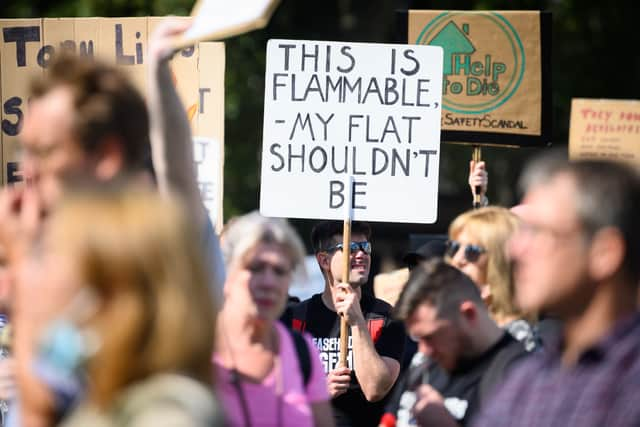Cladding scandal: Government told to ‘get a grip’ as £400m allocated for London unspent
and live on Freeview channel 276
The government has been accused of failing to “get a grip of the building safety crisis”, after new data shows that less than £1bn has been spent nationally replacing dangerous non-ACM cladding from people’s homes.
The Building Safety Fund (BSF), which pays for the remediation of unsafe non-aluminium composite material (ACM) cladding from homes of 18 metres or taller, was first-announced by then-chancellor Rishi Sunak in his March 2020 budget.
Advertisement
Hide AdAdvertisement
Hide AdInitially given £1bn to provide support, a further £3.5bn was granted in February 2021, with eligibility recently expanded to include buildings 11 metres and taller.
Funding is delivered via the BSF directly to the owner or freeholder, with all building owners having a legal responsibility to make sure their properties are safe.
A department for levelling up, housing and communities (DLUHC) spokesperson said this means that where remediation works are required, “they must take appropriate action without delay”.
New data however shows that, since the BSF was announced three years ago, less than £1bn has been spent, with one campaigner accusing the government of leaving leaseholders “trapped in limbo with no control over their futures”.


What does the data show?
Advertisement
Hide AdAdvertisement
Hide AdAccording to figures published by the DLUHC, £927m has been spent via the BSF as of March 31, from £1.848bn allocated for works so far.
While that data does not specify a regional breakdown, housing minister Lee Rowley recently responded to a written question from Labour MP Hilary Benn, submitted on March 28, outlining how £416m had been spent via the BSF in London, from an allocation of £891m.
This was by far the highest amount both allocated and spent, with the North West, which recorded £370m in allocation and £176m in expenditure, coming next.
Looking at the latest figures, which were published on April 20 and account for works up to March 31, it appears as if a further £47m has been spent from the fund across the UK since February 28, the date to which the numbers in Mr Rowley’s response were referring.
Advertisement
Hide AdAdvertisement
Hide AdLondon accounts for more registrations for funding from both the private (1,634) and social (190) sectors than the rest of England combined, with 2,107 buildings estimated to be registered in the capital.
Across the UK, the data shows that remediation has been completed on just 28 buildings with unsafe non-ACM cladding, including getting the green light from building control, with a further 96 awaiting sign-off. The latest figures for remediation on buildings with unsafe ACM cladding, which is funded separately, show far higher rates of completion, with 73% (357) of those identified having had all of their works finished, including building control sign-off.
‘Collective state and industry failure’
Giles Grover, co-lead of the End Our Cladding Scandal campaign group, told LondonWorld that the total expenditure to date “spells out the failure of the government to get a grip of the building safety crisis”.
Mr Grover described the first-come-first-serve basis on which funding was announced in 2020 as “perverse”, with an initial window of just two months for registrations, and that the group has seen “little evidence” of the money being issued effectively since.
Advertisement
Hide AdAdvertisement
Hide Ad“The government will no doubt blame building owners for the delays, and we recognise that those entities were refusing to sign grant funding agreements so that work could proceed,” he said. “However, the government simply elected to continue its failed strategy of hoping that stakeholders would now do the right thing.
“This has always been a collective state and industry failure – the failure of the state to ensure the regulatory regime was fit for purpose alongside the decades-long focus of industry on their profits over our safety as they cut corners and value engineered away important safety measures at our homes.
“All parties have long recognised that leaseholders are the only truly innocent parties in this horror show, but the action on the ground has continually failed to match those warm words with too many ordinary people still ruled out of protection.”
While acknowledging the work done by the levelling up secretary, Michael Gove, to “reset” the government’s approach to building safety, Mr Grover added: “We have seen little evidence that the repeated mistakes of the past have led to any lessons being learned.
Advertisement
Hide AdAdvertisement
Hide Ad“Innocent leaseholders across the country remain trapped in limbo with no control over their futures.”
The department for levelling up, housing and communities
Asked about the allocations from the BSF and whether there had been any issues getting the money spent, a DLUHC spokesperson said the funding is provided to whoever is responsible for an eligible building, which is usually the owner or a freeholder.
“Building owners are therefore responsible for planning and delivery of the remediation,” they added.
“This can be a complex construction project on a high-rise building, and we provide expert support for them with thisto make sure it is planned and delivered correctly.”
